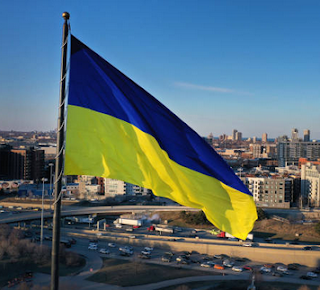Unfortunately, we have very little in the way of good news this week, and we begin with some very sad news, but here are this week’s news items:
 |
| Dr. Samuel Angelo Nigro |
• Dr. Samuel Angelo Nigro, RIP. It is with deep sadness that we report the death of long-time CESJ friend and supporter, Dr. Sam Nigro of Cleveland, Ohio, on April 22, 2022 a few weeks after his 85th birthday. We extend our deepest sympathies and condolences to his friends and family. Sam was a long-time supporter of the ideas of the Just Third Way and was always quick to give us his encouragement and share the ideas with others in his network. Having friends in Ukraine, Sam has for many years forwarded CESJ material to that country, with special urgency during the current war. A fellow graduate of the University of Notre Dame, Sam shared with this writer copies of his extensive and unique collection of Notre Dame memorabilia, considering the Just Third Way completely in tune with “the Spirit of Notre Dame.” Sam’s uncle, the legendary D.M. “Doc” Nigro, played football with Knute Rockne, and the Nigro and Rockne families have remained friends.
• Federal Reserve Raising Rates. It’s being touted as the biggest interest rate increase in twenty years — a half-point increase. The idea is to fight inflation . . . by raising the cost of doing business. Actually, what raising the interest rate does is add cost-push inflation to “demand-pull” inflation for a double whammy. The government is still pumping massive amounts of “legal counterfeit” money (Irving Fisher’s term, not ours), causing demand-pull inflation in both the primary and secondary markets. (You thought that the incredible increase in the Dow was due to increased values of the companies? Think again.) To this will now be added a higher cost of doing business as companies pay more for credit. This is the perfect scenario for “stagflation”: rising prices and falling production. Part of the problem is that the definition of inflation changes even as the experts use it, sometimes even in the same sentence, depending on how confused the experts are and how much they are trying to confuse others. Pure Keynesian theory is that “real inflation” can only occur after reaching “full employment, so a rise in the price level prior to reaching “full employment” is a necessary price adjustment to reach the “real price.” (Boloney.) The Monetarist/Chicago definition is that inflation means too much money for too few goods and services. (True as far as it goes, but is misleading.) The Austrian definition is that inflation is any increase in the money supply, whether the price level rises, falls, or stays the same. (Theoretically consistent, but based on the erroneous Currency Principle.). These definitions and the weird policies they determine are all based on the assumption that the quantity of money determines the level of economic activity, i.e., that production derives from money. No. The truth is that the level of economic activity determines the amount of money (absent manipulation). Money derives from production, not the other way around.
 |
| It's all kind of, uh, "fake." |
• Strong Ruble, Weak Country? It sounds like a paradox, but the Russian Ruble has hit a two-year high in value. How is this possible at a time when the Russian economy is weakening at a tremendous rate? The answer is fairly easy to understand. As is the case with virtually every country on Earth, Russia views money and credit as a commodity, not a tool to facilitate exchanges. If Russia had a true understanding of money, there would be no story in a strong or weak Ruble, as the statement would be meaningless, being similar to a claim that in Russia the meter was 150 centimeters long and therefore stronger than the Argentinian meter, which was only 18 centimeters long; Russia has a strong meter, while Argentina has a weak meter. Huh? Once we realize that money is a way of measuring value, just as a meter is a way of measuring length, we realize how silly it is to talk about strong or weak currencies. The only reason Russia has a “strong currency” right now is that it pegged it to gold to prevent it from weakening. It doesn’t mean that the Russian economy has some hidden strength nobody knows about.
• Buy, Borrow, and Die. How do the rich stay rich? By using their own money to get rich? No. By using other people’s money to get rich? No. They do it by creating money to purchase assets that buy themselves, paying for it with the future profits generated by the assets themselves.
 |
| Oil as a weapon can backfire. |
• Putin’s Economic War Heats Up. In desperation, as it becomes increasingly clear that Ukraine is winning, Russia is “weaponizing” its fossil fuel exports. This could easily backfire, especially given the possibility of nuclear fusion becoming commercially viable in as few as five to ten years. Lacking a way to blackmail the rest of the world, and its increasing pariah status, Russia can easily isolate itself from the rest of the world. Experts have already claimed that Putin’s War has pushed the Russian economy back twenty years, and it could easily go into a termanial tailspin without the Economic Democracy Act . . . which would, in and of itself, constitute a greater threat to Putin than NATO, the U.S., or any Jewish Nazis in Ukraine.
• Permanent Olympic City? Tired of all the wrangling about the Olympic Games . . . if you even bothered with them this time around? Here’s a proposal that would take a lot of the politics out of the event and give Greece a needed economic boost.
 |
| Not even the thief Putin has the cash to pay for this |
• Financing the Rebuilding. It’s an interesting approach, but it’s not us. After consulting with his cabinet, President Zelenskyy announced the formation of a fundraising program to raise the money to rebuild Ukraine. Kudos is due Zelenskyy for thinking ahead, and the funds will be needed, but they won’t cover all the damage — nor should they. As we’ve stated a number of times already, the best bet for Ukraine is to implement the Economic Democracy Act as soon as possible. This relies not on existing cash to finance feasible new capital, but on self-liquidating assets, i.e., assets that pay for themselves out of their own future profits. New money can be created by the banking system in non-inflationary ways that turn everyone into an owner of the new capital, thereby giving everyone a concreate stake in economic growth and a stable political order.
• Fritz Lang’s MetropolisRedux. In film director Fritz Lang’s 1925 classic Metropolis, rich industrialists built a robot to foment discord among the workers to keep them in their place as de facto slaves of the wealthy. Nowadays the idea is not to keep workers in their place, but to get rid of them entirely, turning them into what the Nazis called “useless eaters” who contribute nothing to the State (or to the wealth of the rich). That’s why the Chinese workers’ paradise is working on creating an army of robots to carry out production . . . which sort of leaves Chinese workers hanging out to dry.
• Follow the Money. Some experts have expressed bafflement as to how Russia, which increased its military spending enormously under Putin, could be suffering from a plague of poorly trained soldiers and substandard, even non-functional equipment. One reason that’s not being talked about is the virtual certainty that the bulk of funds earmarked to modernize Russia’s military went into Putin’s pocket and those of selected friends.
• Russian Cannibals. No, we’re not talking a new atrocity, at least not one committed against human beings. This is “financial cannibalism.” It seems that Russia’s largest shipping company is so hard up for cash that it’s selling off some of its vessels. This is a very bad sign, for it’s the vessels that generate the profits. By selling off the farm (so to speak), the company is “eating itself” and may be unable to produce enough revenue to stay alive as a viable enterprise. It is, in fact, usually a sign that bankruptcy is imminent.
 |
| "I'm not pointing the finger. YOU are." |
• Was Putin Provoked? Russian President Vladimir Putin has justified the invasion of Ukraine on many grounds, depending on who he’s talking to and what day of the week it is, but a common opinion among many of his supporters (and well as Putin himself) is that NATO, the United States, and Ukraine “provoked” Russia, which subsequently acted only in self-defense. Unfortunately for Putin’s evident line of reasoning, “provocation” has a specific meaning in international law as well as in most countries’ legal codes. It means that someone or a country has committed a criminal act which called forth the response. When valid, provocation may mitigate guilt for a response but not remove it. For a claim of provocation to be legitimate, the criminal act must have been performed by the country or individual(s) targeted for reprisal, not by some third party or parties. Thus, if A attacks B for something C did, A was not provoked within the legal meaning of the term. On the contrary — if A attacks B alleging A was provoked by C, A has actually provoked C by committing an illegal act against B and claiming as justification a non-existent provocation by C. This would give C the right to act in self-defense if attacked by C and justify C assisting B who was technically an innocent bystander victimized by A. Admittedly, the actions of NATO after the fall of the Soviet Union may have annoyed or irritated Russia, but they did not constitute provocation by any legal meaning of the term. There were no threats made or implied except in the minds of the Russians, who have something of a history of paranoia. Any psychiatrist will tell you that with someone who is paranoid, you must be extraordinarily careful of your words and actions as anythingcan be construed as a threat. So, Putin cannot claim provocation. Ukraine, on the other hand, can clearly claim provocation dating back to 2014 when Russia illegally annexed Crimea and instigated, supported and funded the separatist movements. Both were clear violations of international law and thus legally constitute provocation. By claiming to have been provoked, Putin is blaming the victim of his own provocation.
• The Greater Reset. CESJ’s new book by members of CESJ’s core group, The Greater Reset: Reclaiming Personal Sovereignty Under Natural Lawis, of course, available from the publisher, TAN Books, an imprint of Saint Benedict Press, and has already gotten a top review on that website. It can also be obtained from Barnes and Noble, as well as Amazon, or by special order from your local “bricks and mortar” bookstore. The Greater Reset is the only book of which we’re aware on “the Great Reset” that presents an alternative instead of simply warning of the dangers inherent in a proposal that is contrary to natural law. It describes reality, rather than a Keynesian fantasy world. Please note that The Greater Reset is NOT a CESJ publication as such, and enquiries about quantity discounts and wholesale orders for resale must be sent to the publisher, Saint Benedict Press, NOTto CESJ.
• Help Joe Walk Again for Economic Justice. Just a reminder, if you haven’t already done so, to visit the GoFundMe campaign and consider making a contribution and spreading word out among your social media networks. It’s off to a good start, but it’s still just a start.
• Hortense and Her Whos. In case you’ve been wondering how you might advance the Just Third Way by introducing it to legislators at any and all levels of government, we’ve made it easy for you, with the “Hortense Hears Three Whos“ initiative. Visit the explanatory website, and consider downloading the postcard to send to people in government. Don’t worry if you think they won’t be open to it, as the postcard is intended to get them to open their eyes.
• Economic Personalism Landing Page. A landing page for CESJ’s latest publication, Economic Personalism: Property, Power and Justice for Every Person, has been created and can be accessed by clicking on this link. Everyone is encouraged to visit the page and send the link out to their networks.
• Economic Personalism. When you purchase a copy of Economic Personalism: Property, Power and Justice for Every Person, be sure you post a review after you’ve read it. It is available on both Amazon and Barnes and Noble at the cover price of $10 per copy. You can also download the free copy in .pdf available from the CESJ website. If you’d like to order in bulk (i.e., ten or more copies) at the wholesale price, send an email to publications@cesj.org for details. CESJ members get a $2 rebate per copy on submission of proof of purchase. Wholesale case lots of 52 copies are available at $350, plus shipping (whole case lots ONLY). Prices are in U.S. dollars.
• Sensus Fidelium Videos, Update. CESJ’s series of videos for Sensus Fidelium are doing very well, with over 155,000 total views. The latest Sensus Fidelium video is “The Five Levers of Change.” The video is part of the series on the book, Economic Personalism. The latest completed series on “the Great Reset” can be found on the “Playlist” for the series. The previous series of sixteen videos on socialism is available by clicking on the link: “Socialism, Modernism, and the New Age,” along with some book reviews and other selected topics. For “interfaith” presentations to a Catholic audience they’ve proved to be popular, edging up to 150,000 views to date. They aren’t really “Just Third Way videos,” but they do incorporate a Just Third Way perspective. You can access the playlist for the entire series. The point of the videos is to explain how socialism and socialist assumptions got such a stranglehold on the understanding of the role of the State and thus the interpretation of Catholic social teaching, and even the way non-Catholics and even non-Christians understand the roles of Church, State, and Family, and the human persons place in society.
• Shop online and support CESJ’s work! Did you know that by making your purchases through the Amazon Smile program, Amazon will make a contribution to CESJ? Here’s how: First, go to https://smile.amazon.com/. Next, sign in to your Amazon account. (If you don’t have an account with Amazon, you can create one by clicking on the tiny little link below the “Sign in using our secure server” button.) Once you have signed into your account, you need to select CESJ as your charity — and you have to be careful to do it exactly this way: in the space provided for “Or select your own charitable organization” type “Center for Economic and Social Justice Arlington.” If you type anything else, you will either get no results or more than you want to sift through. Once you’ve typed (or copied and pasted) “Center for Economic and Social Justice Arlington” into the space provided, hit “Select” — and you will be taken to the Amazon shopping site, all ready to go.
• Blog Readership. We have had visitors from 26 different countries and 26 states, provinces, and territories in the United States and Canada to this blog over the past week. Most visitors are from the United States, the United Kingdom, Canada, Ireland, and India. The most popular postings this past week in descending order were “News from the Network, Vol. 15, No. 15,” “Can Distributism Rebuild Ukraine?“ “JTW Podcast: The Regular Catholic Guy Show, Part I,” “The Purpose of Production,” and “Social Justice, IV: The Characteristics of Social Justice.”
Those are the happenings for this week, at least those that we know about. If you have an accomplishment that you think should be listed, send us a note about it at mgreaney [at] cesj [dot] org, and well see that it gets into the next “issue.” Due to imprudent language on the part of some commentators, we removed temptation and disabled comments.
#30#


